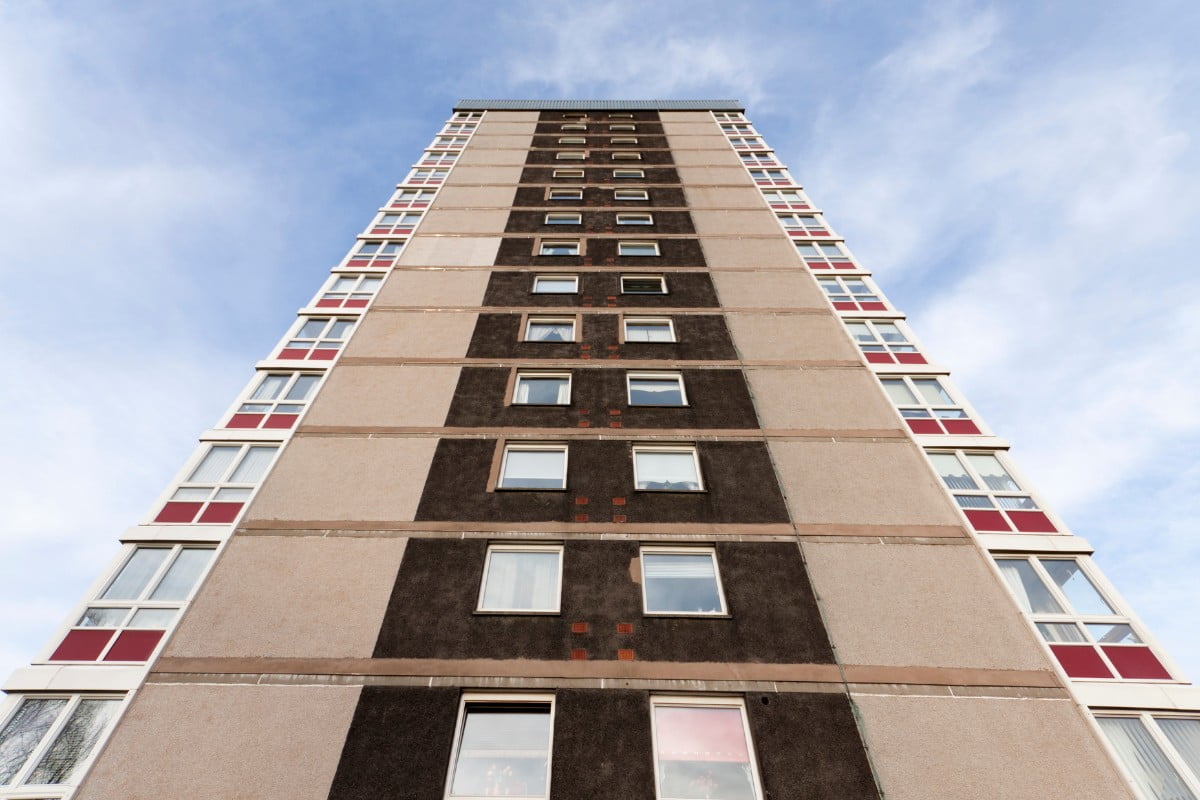Homeowners?
In the absence of decent rented accommodation, thousands of people look to
buy in order to get a roof over their heads. But this is a major problem for
people. The Royal Institution of Chartered Surveyors estimates that
affordability for first-time buyers has fallen by 351% over the last 10 years. Equally,
repossessions were up 20% during 2007, which hit an eight-year high. This
amounted to 27,100 people who had their properties seized during the year. In
the first quarter of 2008, there was a further 17% rise in the number of
repossession orders compared to the same period in 2007. With repossession
orders rising, it is likely that the number of repossessions this year will
dramatically increase. The Council of Mortgage lenders has predicted that
repossessions would reach 45,000 this year — a rise of over 50% on 2007.
There is a myth
that many people in Britain
own their own homes. The reality is that the mortgage companies own most of
these homes — the people in the houses are effectively paying a type of high
rent, for most of their lives. What value is that ownership? They can hardly
sell up, pocket the money and live in a tent! In reality, mortgages are rents
paid as debts.
The total owed
by the UK’s
11.6 million mortgage ‘home-owners’ is more than £1 trillion. This figure is
massive and is nearly equal to the UK’s entire economic output. Nor
will working people in their senior years be secure, when eventually the
mortgage is paid off. The crisis of capitalism is now demanding that
governments start charging for care for the elderly, rather than continue the
care previously provided through the NHS and local council services. The bills
will run into tens of thousands of pounds, and they are demanding payment based
on the value of ‘home ownership’. Having paid surrogate rent all their lives
through mortgages, these ‘home-owners’ will now be faced with losing their home
in their remaining years to pay for care. Needless to say, this will not
trouble the wealthy, but highlights sharply the con-trick of homeownership for
working people in this society.
And before
individual mortgages end, there are years of paying them off. In 2003, about a
third of the take-home pay of a home-owner, on average earnings, was spent on
mortgage repayments; by 2006 this figure was 42%. In 2008 first time buyers
were spending 35% of their disposable income in mortgages — even with two
people working! If we add to these payments the rocketing bills of other household
expenses such as energy and food (where prices are rising at their fastest
since records began), then we can understand that mortgagees are facing major
problems.
If you want to move, you need to sell up. This means paying estate agents
fees and tax to the government to purchase your alternative ‘new’ house. If you
decide to stay and decorate or extend the home, that is also going to cost. The
recent BCIS updated Property Makeover Price Guide for 2008 has estimated that
the average cost of home improvement work has risen by 20% over the past two
years. So much for wage increases below 3%!
Little Hope from New Labour
The shortage of
decent housing, has been an eternal problem for working people; capitalism is simply
not interested in people’s needs, only profits. However, even in terms of the
historical crisis of housing, the situation has deteriorated over the last
twenty five years, and further deteriorated in the last ten years under New Labour. The deterioration is a
direct consequence of abandoning public sector housing and letting the market
supply housing needs.
It is with some
disbelief that after ten years of government, New Labour, who has given public sector housing no support, but
instead has undermined it with a series of stealth privatisation measures, has
introduced the Housing and Regeneration Bill, which passed the Commons and is
currently in the House of Lords. The launch of the bill as the Housing Green Paper
in 2007 set a target of building three million new homes by 2020, and two
million of these by 2016. Note that the emphasis is on ‘targets’ for other
people to reach, not a commitment by the government to actually build these
houses. Such figures would be unrealistic for the market in the best of times,
let alone in the current sub-prime mortgage crisis when house building is
plummeting.
There is little
that is positive in the Bill. The release of public sector land for housing is
a further sell-off of public assets. The environmental spin about new
carbon-neutral eco-towns sounds good, but is again targeted at the private
sector, who will have to ‘bid’ for the projects. The Green Paper only plans for
an extra 20,000 ‘social rented homes’, which is the spin word for ‘but not
council houses’, with the details of how the building will actually happen left
vague. In any case, the figure itself is a mere drop in a brickyard pond —
millions of homes are needed, not 20,000! But what is critical in the Bill is a
series of proposals which are set to further undermine public sector housing,
attacking the security of tenure of tenants and opening the door to wider
privatisation.
The
presentation of the Housing and Regeneration Bill in early April caused one of
the largest backbench revolts against Gordon Brown, as it was rightly seen as a
direct threat to council housing. Twenty-eight MPs backed an amendment to soften
the worst aspects of the Bill — but the revolt was defeated, not surprisingly
by the Tories supporting the government.
The Madness of the Market
In 2001, the
number of extra homes built was the lowest since 1924. Last year house building dropped 10% from the
previous year to about 170,000. The situation has been
bad for several years; but a sharper downturn began in 2006, so much so that in
England, during the last quarter to December 2007, there were only around
37,900 building starts. This is expected to get much worse over the coming year as the
credit crunch bites. In terms of council houses, successive government policies
have created a situation where hardly any new council houses have been built
for the last 20 years.
The housing
shortage has led to very steep rises in house prices over the past few years,
so that many people are now priced out of the house buying market. Even the
projected 20% fall in the coming twelve months because of market failure, will
do little to help people not on the ‘housing ladder’, and it will cripple many
young people who bought houses over the last couple of years.
The failure of
the pro-market New Labour government and
the policies of the Conservatives before them is the failure of the market to
meet housing needs. We need to be honest: the driving force behind the
market is not the meeting of people’s needs, but the pursuit of profits by
capitalists, who then ‘might’ meet people’s needs — if they can make money out
of it. This point is important, because if there are no profits, then housing
will not be supplied — regardless of need. If the capitalist can make more
money by speculating on the stock exchange, or by keeping housing in short
supply so the price goes up, then this will determine how many houses we have. The
whole system is chaotic, unplanned, with booms and over-pricing followed by
crisis. This process only benefits the wealthy, leaving the majority of the
population homeless, or else paying high rents or mortgages. And in the twenty-first
century millions continue to live in overcrowded and squalid conditions.
The Land — Who Owns It?
The other main
factor affecting housing in Britain
is the private ownership of land. The vast majority of land is in the hands of
a few billionaire and millionaire landowners. These people are controlling the
availability of land, often in prime building areas. The total of all
homeowners (with and without mortgages) is around 17 million people; but they
only own a total of 3 million acres of land. Most house owners, taking the size
of the average terrace or semi-detached, and including both the house and
garden, own only about 0.18 of an acre of land. This compares to 40,000
millionaire landowners who control over 28 million acres. For those interested,
this figure does not include the 677,000 acres controlled and owned by the
Royal Family.
If the land you
want to build on is owned by just a few mega rich people, this can make it in
‘short-supply’, then the price they can charge under the market system goes up.
It is not planning permission which is limiting house building, but the power of
these land barons. Their control results in both increases in the price of
houses for sale and in the cost of public house building; overall it limits how
many houses are built.
All these facts
and figures speak for themselves. There is a massive need for affordable housing
for young single people, for families and for pensioners — but this need is not
being met. The market has failed, and it is time for a change. We need a
national planned housing policy designed and resourced to meet people’s needs.
Socialist Policies, Socialist
Government
The Labour
Party has been hijacked by tories-in-disguise, parading under the label New Labour. We just get ministers who
promote big business profits and attack working people, undermining wages and
ignoring housing issues. It is time to reclaim the Labour Party and select
candidates who represent working people; not MPs who represent only themselves
and the rich. We need a Socialist Labour Government.
Through our
trade unions, and working through the Labour Party, we should be fighting to:
- Reject the chaos of the market,
and fight for a planned and organised housing policy to meet people’s
needs - Put all the banks and finance
houses into public ownership (Northern Rock should be the start); do away
with market mortgage uncertainties; provide fixed stable loans for
existing one-home house owners - Employ the 1.2 million workers in
the construction industry for a building programme of 500,000 new housing
units per year, with affordable rents for single people, families and
pensioners - Begin an immediate programme to
renovate and refurbish the existing public housing stock - Fix the level of public housing
rents to an agreed percentage of the tenants’ earnings, up to a maximum, based
on a percentage of the average wage - Take into public ownership the
vast landed estates; free land for housing development and public recreational
use - Take into public ownership the
construction industry, working in conjunction with a national housing plan - Manage all public organisations of
finance, construction and the housing stock based on the principal of democratic
participation and control of those who work in those organisations, the
tenants and the communities they are serving. We want democracy in our
lives; and communities, not dictates from the boardrooms!






